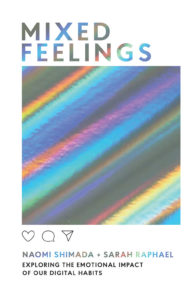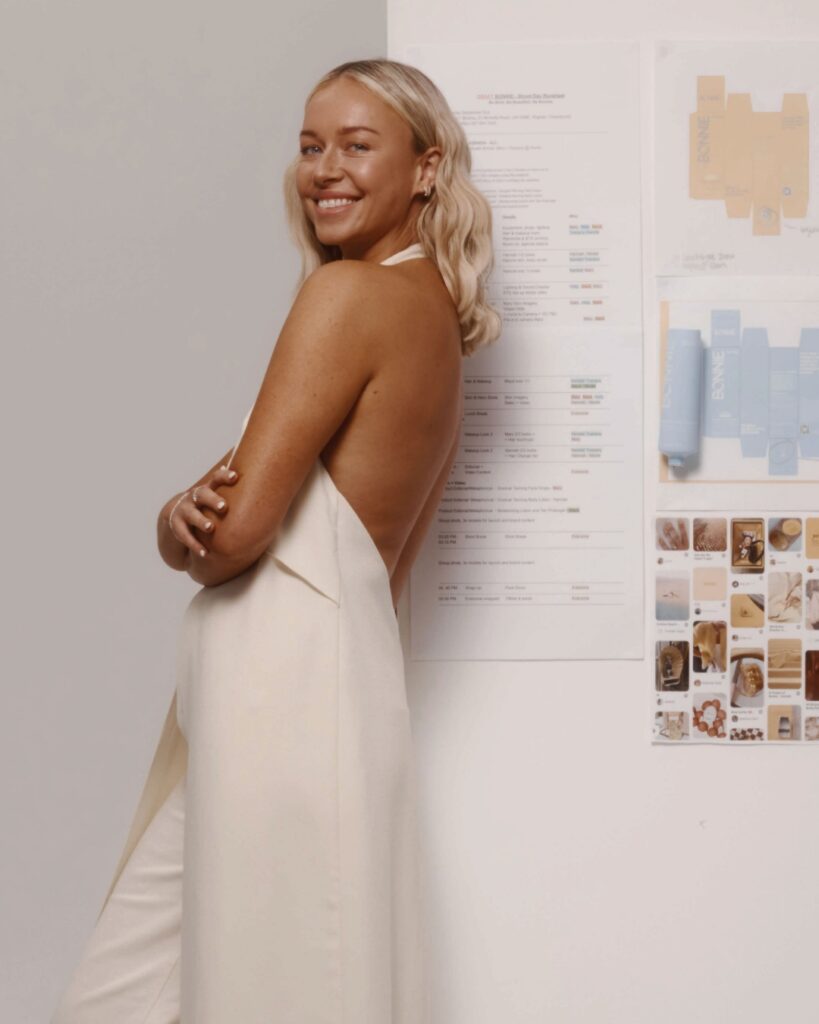You might recognise Naomi Shimada. Maybe you already follow the Londoner on Instagram, with her wide smile and colourful outfits brightening your feed. Or perhaps you’ve seen her in campaigns for brands such as Lonely lingerie, Liam, Outdoor Voices and Nike, as they embrace a more inclusive representation of the human body.
Now Naomi Shimada is adding author to her list of inspiring accomplishments with her new book Mixed Feelings, co-written with British journalist Sarah Raphael. “We work really well together as we are very different people, so we come at things from different angles but with our hearts aligned,” says Naomi.
Their book explores the impact of Facebook and Instagram, and the conflicting emotions our device-driven lives create – weighing up the positives and negatives, examining the complex nuances of modern life and identity, and investigating how we can practice better habits online. Anyone with some sense of self-awareness and reflection will have their own questions about the role such apps play in facilitating content and behavior that spans from inspiring to toxic. For Naomi, this collective sense of unease was undeniable, and as she travelled the world the same topic kept arising. “I would have or overhear conversations from the biggest spectrum of people speaking about weird feelings they had about social media.”
It is this jumble of mixed emotions that spawned the book, and its title. Although it focuses on the impact of this technology and our increasingly performative lives, it was important to both Naomi and Sarah that the discussion existed offline. “We wanted to create an analogue space to explore thoughts and feelings at a slower, more tender pace.”
The negative aspects are undeniable, creating unreal expectations and fuelling entrenched beauty standards. “It’s so easy to put other people’s lives on pedestals when you don’t see what’s going on behind a photo,” says Naomi. She also stresses the need for a critical eye: “It’s important to keep reminding ourselves that it’s insidious because it’s been specifically engineered by tech companies to literally addict us to them.” (Recent research conducted by Michigan State University found that the brain’s reward system responded similarly to social media and substance abuse.)
Naomi also raises the spectre of monetisation and how it drives the design and purpose of these entities. “The longer they keep us on them, the more chance they have of making money out of us.”
The most successful of these, Instagram takes advantage of ingrained traits, like the role comparison and competition play in evaluating success, beauty and value. “They have been created to tap into the things that make us human and magnify them,” reflects Naomi. “It’s in human nature to be curious as to what other humans are doing and to compare ourselves to others. But social media truly magnifies that.”
In the UK, the Royal Society for Public Health found correlations between the intensive use of social apps and mental ill health; only 23 percent of the young people surveyed reported that it had a positive impact, and 46 percent of girls experienced a negative effect on their self-esteem.
Naomi has experienced the effects of this performative world. As her own online popularity grew and her follower count ballooned, she felt pressure to be loyal to her own values. “It personally felt for me like with the numbers came more social responsibility. That I couldn’t just work with any brand or post something that could be seen as irresponsible.”
This sense of accountability also applies to the portrayal of her own life. “I don’t want everyone to look at a photo of me on Instagram and think I have everything figured out, because I don’t. I really don’t! I am learning and a student of all of this just like everyone else.”
Despite those challenges, Naomi believes the experiences and outcomes can be positive. “That’s why we have mixed feelings, right? Because we do see its benefits too! My favourite thing is that it’s given me a way to connect and nurture friendships with people from all around the world. I love learning so many things through the people I follow. At its best, I think social media can be a great tool for accessible education.”

Crucially, Naomi also acknowledges the role these applications have played in providing visibility, representation and dialogue around identity and acceptance. “Movements like body positivity have been able to not only exist but thrive. It’s the first space we’ve been able to see different perspectives of beauty across gender and race spectrums, abilities and ages. That’s been the most exciting thing about social media to me – that in a lot of ways it’s democratised beauty in a way I’ve never seen before.”
With more people feeling increasingly isolated, both physically and socially, Naomi understands the role that mobile devices can play in fostering connections. “Our phones have become little security blankets that have increasingly become a way for us to not be alone.”
When it comes to her own online behaviour, she focuses on the positives, actively sharing things she feels are joyous and uplifting. “We live in a 24-hour news cycle that can make it seem like we live in a world where only terrible things happen. I wanted to share small acts of kindness or things that brought me joy as an act of resistance. I see so much beauty in the world every day and I wanted to share that.”
She now feels less pressure to post regularly, and credits creating Mixed Feelings with giving her a more balanced approach. “Through writing the book, I’ve started to move away from [posting frequently] because it made me a lot more aware about my own behaviour – that I wanted to live a full, present life through my own eyes and not buckle under the pressure of doing something that would ‘look good on the gram’.”
For those wishing to create healthier habits online, Naomi recommends being considered about when and why you use apps like Instagram.
“Do you reach for your phone to fill an empty second? I know I have and sometimes still do,” she admits. “Sometimes I try and leave my phone somewhere just to practice detaching myself from it a bit. To be honest, most of the time I don’t have Instagram on my phone for this exact reason. I recognise I need it for work but I want to use it more time-consciously. So I download it to post something specific or to check my messages.
“This has also made me more considerate of what I post. Instead of posting a bunch of things all the time I just post one or two things sometimes. It helps me stay more present in my day-to-day life.” She also recommends analysing what content is and isn’t enriching your life. “It’s about recognising what your triggers are, what makes you feel good and what doesn’t, and actively deciding to not follow accounts that make you feel ‘less than’ or inadequate.”
When it came to writing and publishing Mixed Feelings, Naomi aimed to pull back the curtain and share her own reality. “I wanted to be honest about my own experiences through this work, for people to see and understand that having a social media following doesn’t make you exempt from human issues or make problems go away.”
For those truly joyful moments in her life, Naomi usually finds them offline. “The best moment of the day can be a smile with a stranger in the street. These moments to me are how I value my life, they are what’s sacred to me,” she explains. “Humanity is what binds us together and I don’t want to ever forget that.”

Mixed Feelings: Exploring the emotional impact of our digital habits is out now, $40, published by Hardie Grant.
Words: Emma Gleason
Photos: Supplied
This article originally appeared in Fashion Quarterly Issue 4 2019.











